Gujarat Board GSEB Solutions Class 9 English Second Language Chapter 10 Ecology for Peace Textbook Exercise Questions and Answers.
GSEB Class 9 English Textbook Solutions Chapter 10 Ecology for Peace (Second Language)
GSEB Class 9 English Ecology for Peace Text Book Questions and Answers
(A) Write your ideas in this table. Work in pairs.
| Detail | Importance in our life |
| Trees | They give us shade and make the surroundings beautiful. They give fruits, wood for furniture and paper. Roots, fruits and leaves of trees are used to make medicines. Birds build their nests in trees. Trees bring rain and make the soil fertile. |
| Birds | We enjoy watching colourful birds and hear their chirping. Birds collect seeds and spread it as they fly, and thus help plants to grow. Some birds like swallows, hawks and eagles feed on snakes, pests and insects that harm crops. Birds like hens give us eggs. |
| Butterflies | It is so much fun to watch colourful and beautiful butterflies flying across in the garden. |
![]()
(B) Discuss this statement in group and present the main points to the class. (Classroom discussion)
IF WE SAVE NATURE, SHE WILL SAVE US.
(C) Sing these lines in chorus. Write its meaning in brief.
(a) ઈશનું રાજ્ય છે આખું,
જે જે આ અવની વિશે,
ત્યાગીને ભોગવી જાણો,
મા વાંછો ધન અન્યનું.
The whole Universe, including
[everything on] this earth, is the
kingdom of God. Do not seek the
wealth of others, but if you can, learn
to sacrifice and enjoy.
(b) सर्वे भवन्तु सुखिनः सर्वे सन्तु निरामया।
सर्वे भद्राणी पश्यन्तु माँ कश्चिद् दुःखमाप्नुयात।।
May all be happy and prosperous.
May all be free from illness.
May all see what is spiritually uplifting
May no one see sorrow or suffering.
![]()
Vocabulary
1. Tick mark the nearest meaning.
Question 1.
chase :
(a) run fast
(b) follow to catch
(c) I walk behind someone
(d) I overtake
Answer:
(b) follow to catch
Question 2.
philosophy :
(a) religion
(b) talking big
(c) wisdom
(d) thinking on life related ideas
Answer:
(d) thinking on life related ideas
Question 3.
prosperity :
(a) improve quality
(b) save
(c) enrichment
(d) proper development
Answer:
(c) enrichment
Question 4.
embrace :
(a) touch
(b) improve
(c) love
(d) accommodate
Answer:
(a) touch
Question 5.
vegetation :
(a) plants and trees
(b) grass
(c) vegetable plants
(d) crop in the field
Answer:
(a) plants and trees
![]()
Question 6.
renounce :
(a) reproduce
(b) renaming
(c) saying no to something
(d) announce
Answer:
(c) saying no to something
2. Fill in the blanks using the words given in the brackets.
(ancient, species, snatch, greed, evolution,abode)
(1) Midas had a greed for collecting money.
(2) Patan is an ancient city.
(3) The Gir forest is an abode of the lions.
(4) Beware of monkeys, they might snatch eatables from your hand.
(5) Man, as a species, has the same place on this earth as other species have.
3. Answer these questions using one or more words from the glossary.
Question 1.
Why does man have more responsibilities than other species ?
Answer:
Man has more responsibilities than other species because he is the crown of creation and he must protect the other species.
![]()
Question 2.
Through what process do inanimate things become animate beings ?
Answer:
Inanimate things become animate beings through the process of evolution.
Question 3.
What will bring peace to man ?
Answer:
Living in peace with nature, divine forces and ultimately himself will bring peace to man.
Question 4.
Which aspect is the most important for creating and maintaining peace on the earth ?
Answer:
Ahimsa or non-violence is the most important aspect for creating and maintaining peace on the earth.
Question 5.
Why should we be grateful to our rishis?
Answer:
We should be grateful to our rishis because they taught us that every matter in the universe is living-in the process of evolution – and so we should practice ahimsa or non violence.
Comprehension
1. Write [✓] if you agree or DA if you do not agree with these statements.
(1) Real peace means absence of war on this earth. [DA]
(2) To become happier, we should collect and consume as much as we can. [DA]
(3) According to our ancient rishis, nothing is lifeless in this universe. [A]
(4) We will thrive only if we take care of ecology. [A]
(5) Kalidas wanted to kill a deer with his arrow. [DA]
(6) Together we progress or together we perish. [A]
![]()
2. Answer the questions.
Question 1.
What are the universal values mentioned in this text ?
Answer:
Preservation and prosperity of all the species, including mankind and the oneness of man and nature are the universal values mentioned in the text.
Question 2.
How can giving up lead to peace ?
Answer:
We should accept only things that are necessary for us. We should not snatch away what belongs to others or is required by others. This will lead to peace.
Question 3.
What should we not do to make this earth a peaceful home for all ?
Answer:
We should not keep others away from having what we actually don’t need. We should not destroy animals, birds, trees or other aspects of nature to make this earth a peaceful home for all.
Question 4.
What do you like about the Indian culture ?
Answer:
Ahimsa or non-violence is what I like about the Indian culture.
Question 5.
How do the Jain sadhus take care of the smallest of living beings ?
Answer:
Jain sadhus put a cloth on their mouths, drink boiled water and do not take food before sunrise and after sunset so that they do not destroy even the smallest bacteria.
![]()
Question 6.
Write three things you will try not to do according to this text.
Answer:
- I will not snatch away what belongs to others or is required by others.
- I will not keep others away from having what I do not need.
- I will not destroy trees, animals, birds and other things in nature.
3. Explain these ideas in three to four sentences.
Question 1.
All living beings have the same right to live and thrive.
Answer:
The whole world is like one single unit. Though all living beings and species are different from one another, we share the same home – the earth. We must learn to live together peacefully. All living beings on this earth have the same right to live and progress.
Question 2.
That peace, I pray, embrace my being.
Answer:
Peace does not mean ‘no-war’. It also does not mean peace between people and countries. True peace can prevail only when man lives in peace with nature, divine forces and himself also. Peace means protecting and preserving nature.
Question 3.
There is enough for everyone’s need but not for their greed.
Answer:
We should not snatch away what belongs to others or is required by others. We should not keep others away from having what we actually don’t need. There is enough for everyone’s need. We should be satisfied and happy with what we have. But if we are greedy, nothing is enough for us-nothing will make us happy.
Question 4.
We have a global heart.
Answer:
Our Indian culture has given us a heart as big as the earth. It teaches us ahimsa or non-violence. We have taught the world the true philosophy of peace and harmony. So we have a global heart.
Language Practice
Krina is asked by her teacher to describe her family members. Read the description and notice the words highlighted.
(1) Krina’s sister :
Krupali is my elder sister. She is as beautiful as a film star. She is 18 years old. She has just passed her 12th Board exams. She is of medium height. She has got short, brown hair. She has got a diamond-shaped face. Her large, blue eyes make her more attractive. She always carries a smile on her face that makes her look pretty. She is good at making friends as she is talkative, cheerful and outgoing Although she is friendly with everyone, she doesn’t like people who are critical of her actions. I love her a lot.
(2) Krina’s mother :
The most loving person in my life is my mother, Geeta. She is a home – maker. She is a middle-aged woman, in her forties. Even at this age, she looks beautiful. She is tall and thin. I like her thick, long, straight, black hair. She is very kind and easy-going. She always talks with people politely. She is a responsible, dependable and a patient woman. She is the closest person to me in my life.
![]()
(3) Krina’s brother :
Krutarth is my younger brother. He studies in 9th class. He is fairly short and slightly overweight. His round face makes him look cute. He is fond of changing his hairstyles. Earlier he had long hair, but nowadays he keeps crew-cut style. Although he is fashionable, he is shy by nature. He loves painting and he is creative too. He is very possessive about his things. At the same time he is lazy too, especially in his homework.
1. Now list out the words used to describe ‘physical features’ and ‘other qualities’.
| Physical features | Other qualities |
| beautiful | talkative |
| old | cheerful |
| medium height | outgoing |
| short | friendly |
| brown | critical |
| diamond-shaped | loving |
| large | kind |
| blue | easy-going |
| attractive | responsible |
| pretty | dependable |
| middle-aged | patient |
| tall | fashionable |
| thin | shy |
| thick | creative |
| long | possessive |
| straight | lazy |
| black | |
| overweight | |
| round | |
| cute | |
| crew-cut |
2. Study the words and expressions used to describe people in the table below.
Age : young, middle-aged, elderly, old, teenager, adult, in his / her early / mid / late 20s (30s, etc.)
Height : short, fairly short, medium or average height, pretty, tall
Boy : fat, plump, overweight, thin, skinny, slim, sturdy, well-built, muscular
Hair : dark, red, blond (light-coloured), long, short, straight, curly, shoulder length, bald, ponytail
face : round, long, oval, freckled (spotted) skin”
Skin : fair, dark, pale, light, chocolate-coloured
Eyes : dark, big, slanted, almond-shaped, thick eyelids, blue / green
![]()

Work in pairs. Describe yourself and your partner using at least five expressions mentioned above.
| I | My partner |
| (1) 1 am tall and thin. (2) My skin is light. (3) I have a round face. (4) I have dark eyes. (5) I have straight and long hair. |
(1) Heena is short and fat. (2) She has a fair skin. (3) She has an oval face. (4) Her eyes are blue. (5) She has long and curly hair. |
(3) Read the following conversation :
Neha: Hello ! I am looking for someone. His name is Mr Anurag.
Information counter :Well, what does he – look like ?
Neha: He’s pretty tall, with short hair. And he generally wears kurta.
Information counter: OK. And how old is he?
Neha: He’s about 40, I guess.
Information counter : Does he wear glasses ?
Neha :Yes, he does. He also keeps a moustache and a beard.
Information counter: Oh, it must be Patil
Sir then. He will be around the Water Projects section.
Neha: Thank you. I’ll go and look for him.
![]()
4. Answer the questions in one or two words.
Question 1.
How old is your brother/sister/ mother/father ?
Answer:
10 years/16 years/42 years/45 years
Question 2.
What does he / she look like ?
Answer:
cute / beautiful / graceful / handsome
Question 3.
How tall is he / she ?
Answer:
short / average height / medium height /tall
Question 4.
What colour is his / her hair ?
Answer:
black / brown / black / black
Question 5.
How long is his / her hair ?
Answer:
crew-cut / short / long / short
Question 6.
Does he / she wear glasses ?
Answer:
No. / No. / No. / Yes.
Question 7.
Does he (father) have a moustache ?
Answer:
No
Question 8.
Does he (father) keep a beard ?
Answer:
No
Question 9.
What sort of clothes does he / she prefer to wear ?
Answer:
shorts and T-shirt / jeans and T-shirt / sarees / trousers and shirt
Question 10.
What does he / she do?
Answer:
study / study / housewife / businessman
5. I Sit with any of your classmates and write 7 to 10 questions about him/her. Then take turns asking and answering the questions. Write a note on your partner.
Example :
How tall is Jignesh ?
He is 5 tall.
Question 1.
How old is Mayura ?
Answer:
She is 13 years old.
Question 2.
How tall is Mayura ?
Answer:
She is 5′ tall.
Question 3.
What does she look like ?
Answer:
She is beautiful. She has brown eyes and long, black hair.
![]()
Question 4.
Where does she live ?
Answer:
She is my neighbour.
Question 5.
What do her parents do ?
Answer:
Her father is a lawyer and her mother is a teacher.
Question 6.
How many brothers / sisters does she have ? What is his / her name ?
Answer:
She has a younger brother. His name is Rohan.
Question 7.
Is she good in her studies ?
Answer:
Yes, she is good in her studies.
Question 8.
What does she like ? (sports /reading / painting / dancing / music)
Answer:
She likes sports and music.
Question 9.
What are her other qualities ?
Answer:
She is kind, helpful and very active.
![]()
Question 10.
How does she help you?
Answer:
She helps with all my work. We study and play together. Mayura is my friend. She is 13 years old. She is 5 tall. She is tall. She has brown eyes. She has long, black hair. Mayura is my neighbour. Her father is a lawyer. Her mother is a teacher.
She has a younger brother. His name is Rohan. Mayura is good in her studies. She also likes sports and music. Mayura is kind, helpful and active. She helps me with all my work. We study and play together.
6. Make a list of some qualities and habits of your English teacher in class VIII. Write a paragraph on that teacher, using the words you have enlisted. Here is an example of a passage on ‘My Best Friend’. Read it and then write a passage on your ‘best friend’.
My Best Friend
I think I am lucky because Sunil is my friend. He is 14 years old. He lives in the same town. He is my neighbour and we are classmates. (general information)
He is of medium height and well- built. He has black, curly hair. He has got a round face with black eyes. He has pointed nose and a small mouth. (physical description)
He is helpful, caring and honest. He tries his best to help others in problems. We have the same interests and tastes. I think as time goes by, our friendship will be deeper and stronger, (qualities and relationship)
Answer:
My Best Friend
Neha is my best friend. She is 14 years old. She is my classmate and my neighbour, too. We study and play together. Neha is tall and thin. She has an oval face. She has blue eyes and long, black and straight hair. She has a fair skin. Neha is clever and helpful. She is very active. She is always ready to help everyone. Neha and I have the same hobbies. Both of us like painting, dancing and music. We also like to study. As time goes by, our friendship grows stronger and stronger.
Writing
1. Look at these pictures and frame a story based on them. Use the words and phrases given below them. Give a proper title to the story. Work in pairs.
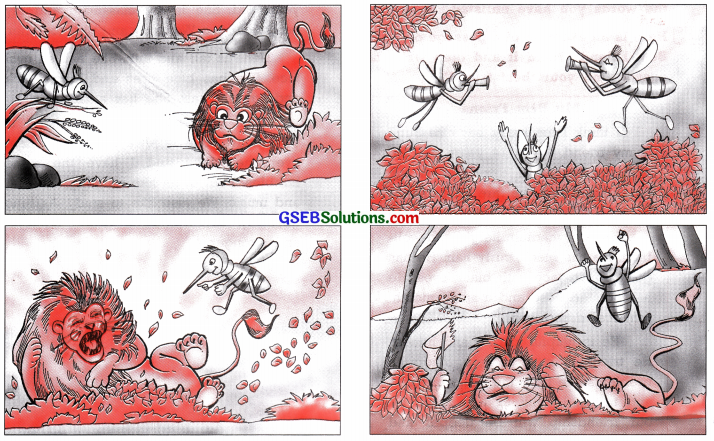
lion-under a bush-swarm of mosquitoes – lion’s boasting about his strength – mosquitoes’ warning – lion’s challenge – mosquitoes’ attack – lion’s attempts to kill them – mosquitoes bite continuously – lion jumping up and down-lion unable to fight – extremely tired-urged the mosquitoes to let him go – take pity on the lion – fly away
The Lion and the Mosquitoes
A lion was lying under a bush. A swarm of mosquitoes was buzzing over him. After a while, the lion woke up. And he said to himself, “I am so strong that I need not fear anyone on this earth !” The mosquitoes heard him. “Don’t think that no one is stronger than you. Even we can challenge you,” said one of them.
![]()
“Silence, you little insects !” roared the angry lion. “Mind you, I can crush the whole lot of you with a single paw!” The mosquitoes could not bear this. Their leader said, “Come on friends, let’s show him our strength.
He is boasting too much !” So the whole swarm of mosquitoes attacked the lion. They began to bite him all over ! The lion jumped around furiously. He tried to kill the mosquitoes. But he could kill only a few of them. The swarm kept on biting him and never stopped. The lion jumped up and down.
He ran madly around the bush. The lion was tired. He could not fight them back. At last he urged, “Please stop biting. Take pity on me and leave me alone. Now, I know, I am not the strongest.” The leader said, “Don’t boast of your strength ever again.”
2. Discuss in groups of five on ‘Unity in Diversity – The Essential Characteristic of India’. Write a paragraph on it. You may use the following words, phrases and ideas.
differences in languages, religions, communities, castes, creeds, regions and yet live as Indians etc.
Unity in Diversity – The Essential Characteristic of India
‘Unity in Diversity’ means ‘unity even after various differences’. And this unity in diversity is the essential characteristic of India. It is only in India that people of different religions, creeds, castes, languages, culiures, lifestyles, rituals of worship, etc. live together with harmony.
It is only in India where people of different religions like Hinduism, Buddhism, Islam, Sikhism, Jainism, Christianity and Parsees live together. People here celebrate their festivals like Holi, Diwali, Id, Christmas, etc. very peacefully without harming other religious people.
In spite of being from different cultures, traditions, religions and languages, people respect each other and live together with lots of love and feeling of brotherhood. People of all religions joined hands to free India from the British rule. The freedom struggle is the greatest example of unity in diversity in India.
Comprehension
A. Read the extracts and answer the questions.
(1) The Vedas sing about oneness of man and nature. The idea expressed in the ancient texts have universal value. We have always tried for the preservation and prosperity of all the species including mankind on this earth.
Question 1.
What do the Vedas talk about ?
Answer:
The Vedas talk about the oneness of man and nature.
![]()
Question 2.
What have we ahyays tried ?
Answer:
We have always tried for the preservation and prosperity of all the species including mankind on this earth.
Question 3.
The ideas expressed in the ancient texts have….
Answer:
The ideas expressed in the ancient texts have universal value.
(2) The Atharva Veda gives us a great idea : It means the whole world lives as one single unit like a nest. All the living beings have the same right to live and thrive. This can be achieved through coliving only.
Question 1.
What does the Atharva Veda say about living beings ?
Answer:
The Atharva Veda says that all living beings have the same right to live and thrive.
Question 2.
How does the whole world live ?
Answer:
The whole world lives as one single unit like a nest.
Question 3.
How can we live as one single unit ?
Answer:
We can live as one single unit through co-living.
![]()
(3) We are the birds of the same nest. We may wear different skin, different clothes, speak different languages, believe in different religions, belong to different cultures – yet we share the same home : our earth! Born on the same planet, covered with the same sky, gazing at the same stars, breathing the same air, we must learn to progress and prosper together happily or perish together miserably.
Question 1.
What must we learn ?
Answer:
We must learn to progress and prosper together happily or perish together miserably.
Question 2.
‘We are birds of the same nest.’ How?
Answer:
We are the birds of the same nest because though we have different skin, wear different clothes, speak different languages, believe in different religions, belong to different cultures – we live in the same home : our earth.
Question 3.
What do we share ?
Answer:
We are born on the same planet, covered with the same sky, gaze at the same stars and breathe the same air.
(4) Our idea of peace does not mean just a state of ‘no-war’, neither is it limited just to men or countries and communities. But it embraces the whole nature and the whole creation.
Question 1.
What is our idea of peace ?
Answer:
Our idea of peace embraces the whole nature and whole creation.
Question 2.
To what is our idea of peace not limited ?
Answer:
Our idea of peace is not limited to men or countries and communities.
Question 3.
What does our idea of peace embrace ?
Answer:
Our idea of peace embraces the whole nature and the whole creation.
(5) Let’s try to understand this shanti mantra from the same Atharva Veda:
May there be peace in heaven, peace in space, peace on earth.
May there be peace in trees, peace in vegetation and plants.
May there be peace in our gods and in entire creation.
May there be peace everywhere and be it only peace.
That peace, I pray, embrace my being!
This mantra warns us not to disturb nature, not to abuse, pollute or destroy our surroundings up to the heaven. In trying to master and get benefit of our ecology, we are simply destroying ourselves, our own nest. True peace will prevail only when man lives in peace with nature, divine forces and ultimately himself.
![]()
Question 1.
What does the shanti mantra warn us ?
Answer:
The shanti mantra warns us not to disturb nature, not to abuse, pollute or destroy our surroundings up to the heaven.
Question 2.
What are we doing in trying to master ecology ?
Answer:
In trying to master ecology, we are destroying ourselves, our earth.
Question 3.
When will true peace prevail ?
Answer:
True peace will prevail when man lives in peace with nature, divine forces and ultimately himself.
(6) The wise rishi or seer of Ishavasya Upanishad gives us a wonderful advice :
The rishi says : everything animate or inanimate that is within the universe is enlivened by the supreme power. One should therefore, accept only those things necessary for oneself. This world must be enjoyed by renouncing it. Moreover one must not snatch away what belongs to or is required by others. The whole creation is filled with the presence of God.
Question 1.
What does the rishi say about everything that is animate and inanimate in the universe ?
Answer: The rishi says that everything that is animate or inanimate in the universe is given life by the supreme power.
Question 2.
What should we accept ?
Answer:
We should accept only these things that are necessary for us.
Question 3.
What should we not snatch away ?
Answer:
We should not snatch away what belongs to others or is required by others.
(7) This is a message against the animalistic greed of human beings. We should not, like a vulture, keep others away from having what we actually don’t need. Gandhiji also said: ‘There is enough on this earth for everybody’s need, but not sufficient for one’s greed.’
Question 1.
What do we do because of our greed ?
Answer:
Our greed keeps others away from having what we do not need.
Question 2.
What did Gandhiji say?
Answer:
Gandhiji said that ‘there is enough on this earth for everybody’s need, but not sufficient for one’s greed.’
(8) As the crown of creation, man must protect and not exploit and consume other animals. If man stopped destroying animals, trees or other aspects of nature, our world would become less violent and thus a peaceful abode for all.
Question 1.
What must man do?
Answer:
Man must protect and not exploit and consume other animals.
Question 2.
How can we make the world less violent ?
Answer:
We can make the world less violent when we stop destroying animals, trees and other aspects of nature.
![]()
(9) Mahavir Swami preached ahimsa (non-violence) to that extent that all Jain sadhus put a cloth on their mouth, drink boiled water and do not take food before sunrise and after sunset for not destroying even bacteria. Mahavir Swami believed that we should not disturb or hurt even a stone for a selfish purpose.
Question 1.
What do the Jain sadhus do to protect the smallest creature ?
Answer:
The Jain sadhus put a cloth on their mouth, drink boiled water and do not take food before sunrise and after sunset so that they do not destroy bacteria.
Question 2.
What did Mahavir Swami believe ?
Answer:
Mahavir Swami believed that we should not disturb or hurt even a stone for our selfish purpose.
(10) Rishis believed that every matter in the universe is living. There is nothing like non-living. Everything is in a process of evolution. This was the realism of our ancient seers.
Question 1.
What did the rishis believe ?
Answer:
Our rishis believed that every matter in the universe is living.
Question 2.
What was the realism of our ancient seers ?
Answer:
Everything in the universe is living and in a process of evolution. That was the realism of our ancient seers.
(11) Mahakavi Kalidas has written a play: Abhijnan Shakuntalam. In a scene, King Dushyant of Bharatvarsh enters the ashram of Rishi Kanva. He is in his chariot, chasing a deer for hunting. Two disciples of Kanva saw him and immediately asked him not to shoot his arrows at the deer. They said: O king! Don’t shoot, please, don’t shoot the arrow at the tender body of this deer. It is as bad as putting fire on the heap of flowers.
Question 1.
What was King Dushyant doing ?
Answer:
King Dushyant was chasing a deer for hunting.
Question 2.
Who stopped the king from hunting the deer ?
Answer:
Two disciples of Kanva rishi stopped the king from hunting the deer.
Question 3.
According to the disciples, shooting an arrow at the deer was …
Answer:
According to the disciples, shooting an arrow at the deer was as bad as putting fire on a heap of flowers.
(12) This shows that ahimsa was very much in the blood of ancient people and it became the tradition of Indian culture. Our culture has given us a heart as big as this earth; we have a global heart. Ancient wisdom teaches the world the true philosophy of universal peace and harmony.
Question 1.
What does the extract say about ahimsa ?
Answer:
Ahimsa was very much in the blood of ancient people and it became the tradition of Indian culture.
Question 2.
What does ancient wisdom teach the world ?
Answer:
Ancient wisdom teaches the world the true philosophy of universal peace and harmony.
Question 3.
What has our culture given us?
Answer:
Our culture has given us a global heart – as big as this earth.
![]()
B. Use the set of words in your own sentences.
Question 1.
peace – to express
Answer:
The saint has expressed his wish for peace among the people.
Question 2.
prosperity – to believe
Answer:
People believe that worshipping Goddess Lakshmi brings prosperity in the house.
Question 3.
to include – religion
Answer:
The committee formed by the sarpanch includes people of all religions.
Question 4.
species – preservation
Answer:
Preservation and protection of the tiger and the lion is very necessary because they are endangered species.
Question 5.
nature – value
Answer:
Children must be taught the value of protecting the resources of nature.
Question 6.
mankind – to achieve
Answer:
Mankind has achieved a lot of progress in the field of medical science.
Question 7.
ancient – text
Answer:
This museum has preserved texts like the Ramayana and the Mahabharata as they are our ancient epics.
Question 8.
to thrive – harmony
Answer:
People of all religions and communities must live in peace and harmony to thrive.
Question 9.
culture – message
Answer:
Exchanging sweets and messages of best wishes on festive occasions has been our culture since ages.
Question 10.
to gaze – surroundings
Answer:
The visitors gazed with wonder at the beautiful surroundings of the hill station.
Question 11.
snatch – to chase
Answer:
Anil chased the man who had snatched – his bag.
Question 12.
to require – sufficient
Answer:
We require more funds because what we have collected now is not sufficient to build a new school.
Question 13.
presence – violent
Answer:
In spite of the presence of a large police force, the violent crowd attacked the factory.
Question 14.
to progress – community
Answer:
The women of the village are working hard for the progress of their community. ‘
Question 15.
greed-to warn
Answer:
The minister warned the king that his greed would destroy him.
Question 16.
prosper – exploit
Answer:
It is said that the rich prosper by exploiting the poor.
Question 17.
perish – consume
Answer:
Many birds and animals perish by consuming plastic thrown in the garbage.
Question 18.
miserably – selfish
Answer:
Ramji was so selfish and greedy that he lost all his friends and lived miserably.
![]()
Question 19.
protect – entire
Answer:
The police has spread in the entire area to protect all the people.
Question 20.
limited – process
Answer:
Raju has limited knowledge of the process of making earthen pots.
Question 21.
aspect – matter
Answer:
The principal has studied all the aspects before giving his decision in this matter.
Question 22.
to accept – disciple
Answer:
Dronacharya refused to accept Ekalavya as his disciple.
Question 23.
preach – non-violence
Answer:
Our saints have always preached for peace and non-violence.
Question 24.
creation – benefit
Answer:
The creation of good syllabus will benefit all the students.
Question 25.
to disturb – purpose
Answer:
The children were enjoying the party but their purpose was not to disturb the neighbours.
Question 26.
extent – necessary
Answer:
It is necessary to tell the students the extent to which they should use the freedom given to them.
Question 27.
abuse – force
Answer:
The people of the kingdom used all the force to prevent the king from abusing his powers.
Question 28.
pollute – destroy
Answer:
When we pollute air and water, we are destroying our own future.
Question 29.
to master – ultimately
Answer:
After a lot of practice, Nita has ultimately been able to master the art of making paper flowers.
Question 30.
prevail – tradition
Answer:
Sati was an evil tradition that prevailed in some communities in the olden days.
Question 31.
immediately – shoot
Answer:
The hunter saw the deer and immediately shot an arrow.
Question 32.
tender – heap
Answer:
Please do not step on the heap of tender flowers.
Question 33.
accept – wisdom
Answer:
The king accepted that Birbal’s wit and wisdom had solved many problems.
C. Fill in the blanks choosing the correct words from the brackets.
(1) (universal, ancient, oneness)
The Vedas sing about oneness of man and nature. The idea expressed in the ancient texts have universal value.
(2) (species, preservation, mankind)
We have always tried for the preservation and prosperity of all the species including mankind on this earth.
(3) (thrive, nest, co-living)
The whole world lives as one single unit like a nest. All the living beings have the same right to live and thrive. This can be achieved through co-living only.
(4) (languages, earth, cultures)
We are the birds of the same nest. We may wear different skin, different clothes, speak different languages, believe in different religions, belong to different cultures – yet we share the same home : our earth !
(5) (communities, peace, creation)
Our idea of peace does not mean just a state of ‘no-war’, neither is it limited just to men or countries and communities. But it embraces the whole nature and the whole creation.
![]()
(6) (abuse, surroundings, warns)
This mantra warns us not to disturb nature, not to abuse, pollute or destroy our surroundings up to the heaven.
(7) (destroying, to master, ecology)
In trying to master and get benefit of our ecology, we are simply destroying ourselves, our own nest.
(8) (ultimately, prevail, divine)
True peace will prevail only when man lives in peace with nature, divine forces and ultimately himself.
(9) (supreme, advice, universe)
The wise rishi or seer of Ishavasya Upanishad gives us a wonderful advice Everything animate or inanimate that is within the universe is enlivened by the supreme power.
(10) (world, accept, renouncing)
One should therefore, accept only those things necessary for oneself. This world must be enjoyed by renouncing it.
(11) (snatch, presence, creation)
Moreover one must not snatch away what belongs to or is required by others. The whole creation is filled with the presence of God.
(12) (greed, message, vulture)
This is a message against the animalistic greed of human beings. We should not, like a vulture, keep others away from having what we actually don’t need.
(13) (need, earth, sufficient)
Gandhiji also said: There is enough on this earth for everybody’s need, but not sufficient for one’s greed.
(14) (exploit, protect, crown)
As the crown of creation, man must protect and not exploit and consume other animals.
(15) (abode, violent, aspects)
If man stopped destroying animals, trees or other aspects of nature, our world would become less violent and thus a peaceful abode for all.
(16) (preach, selfish, destroying)
Mahavir Swami preached ahimsa (non-violence) to that extent that all Jain sadhus put a cloth on their mouth, drink boiled water and do not take food before sunrise and after sunset for not destroying even bacteria. Mahavir Swami believed that we should not disturb or hurt even a stone for a selfish purpose.
(17) (universe, realism, evolution)
Rishis believed that every matter in the universe is living. There is nothing like non-living. Everything is in a process of evolution. This was the realism of our ancient seers.
(18) (hunting, immediately, disciples)
In a scene, King Dushyant of Bharatvarsh enters the ashram of Rishi Kanva. He is in his chariot, chasing a deer for hunting. Two disciples of Kanva saw him and immediately asked him not to shoot his arrows at the deer.
(19) (tender, heap, shoot)
Don’t shoot, please, don’t shoot the arrow at the tender body of this deer. It is as bad as putting fire on the heap of flowers.
(20) (tradition, ancient, culture)
This shows that ahimsa was very much in the blood of ancient people and it became the tradition of Indian culture. Our culture has given us a heart as big as this earth;
(21) (harmony, wisdom, global)
We have a global heart. Ancient wisdom teaches the world the true philosophy of universal peace and harmony.
Ecology for Peace Summary in Gujarati
વેદમાં માનવ અને પ્રકૃતિના એકત્વ વિશે ખૂબ લખવામાં આવ્યું છે. પ્રાચીન ગ્રંથોમાં વ્યક્ત થયેલા વિચારોનું મહત્ત્વ (આજે – પણ) વિશ્વવ્યાપક છે. આપણે માનવજાત સહિત પથ્વી પરની બધી જ જાતિઓની સુરક્ષા અને સમૃદ્ધિ માટે પ્રયત્નશીલ રહ્યા છીએ. અથર્વવેદની એક સુંદર કલ્પના છે યત્ર વિશ્વમ મત : નીડા એટલે કે આ આખુંય વિશ્વ એક માળાની જેમ એક સમુદાય તરીકે રહે છે. દરેક જીવને જીવવાનો અને સમૃદ્ધ થવાનો સમાન અધિકાર છે. (અને) આ સહજીવન દ્વારા જ શક્ય થઈ શકે છે.
![]()
આપણે સૌ એક જ માળાનાં પંખીઓ છીએ. આપણી ચામડીનો રંગ, પોષાક, ભાષા, ધર્મ અને સંસ્કૃતિ ભલે જુદાં જુદાં હોય, પણ આપણું ઘર એક જ છે – આપણી પૃથ્વી! આપણે સૌ એક ગ્રહ પર જનમ્યાં, એક આકાશથી ઢંકાયેલાં, એક તારાઓને જોતાં, એક હવામાં શ્વાસ લેતાં – આપણે સૌએ એકસાથે આનંદથી પ્રગતિ કરી સમૃદ્ધ થતા શીખવું જ પડશે અથવા દુઃખી થઈ એકસાથે નાશ પામવું પડશે.
શાંતિની આપણી કલ્પના એટલે માત્ર યુદ્ધ નહીં’ની પરિસ્થિતિ નથી, અને તે માત્ર લોકો, દેશ કે સમાજ પૂરતી મર્યાદિત નથી. પણ તે સમગ્ર પ્રકૃતિ અને સમગ્ર સૃષ્ટિને (પણ) સમાવી લે છે. ચાલો આપણે આ જ અથર્વવેદના શાંતિમંત્રને સમજવાનો પ્રયત્ન કરીએ.
થી શાન્તિઃ અંતરિક્ષ શાન્તિઃ પૃથિવી: શાન્તિઃ
શાન્તિઃ ગૌષધથ શાન્તિઃ વનસ્પત: શાન્તિઃ
વિશ્વદેવા: શાન્તિઃ વૃદ્ધઃ શાન્તિઃ શાન્તિવ શાન્તિઃ
સા મા શનિધિ શાન્તિઃ શાન્તિઃ શાન્તિઃ II
સ્વર્ગમાં શાંતિ, અવકાશમાં શાંતિ, પૃથ્વી પર શાંતિ, વૃક્ષોમાં શાંતિ, વનસ્પતિ અને છોડમાં શાંતિ. આપણાં દેવોને શાંતિ અને સમગ્ર સૃષ્ટિમાં શાંતિ. સર્વત્ર શાંતિ અને માત્ર શાંતિ. હું ઈચ્છું કે તે શાંતિ મારા અસ્તિત્વને પણ સમાવી લે. આ મંત્ર આપણને પ્રકૃતિમાં ખલેલ ન પહોંચાડવાની અને આકાશ સુધીના આપણા વાતાવરણનો દુરુપયોગ ન કરવાની કે તેને દૂષિત કરી નાશ ન કરવાની ચેતવણી આપે છે. આપણા પર્યાવરણ પર કાબૂ કરીને તેનો લાભ લેવાના પ્રયત્નમાં આપણે સ્વયે આપણા માળાનો અને આપણી જાતનો નાશ કરી રહ્યાં
છીએ. જ્યારે માનવ પ્રકૃતિ, દેવી શક્તિઓ અને સ્વયં સાથે શાંતિથી જીવશે ત્યારે જ ખરા અર્થમાં સાચી શાંતિ પ્રવર્તશે. આપણે આ કઈ રીતે કરી શકીએ? એક વિદ્વાન ઋષિ ઈશાવાસ્ય ઉપનિષદમાંથી એક સુંદર સલાહ આપે છે :
इशावास्यम् इदं सर्वं यत् किंच जगत्यां जगत।
तेन त्यत्केन भुंजीथाः माँ गृध कस्यस्विध्दनम।।
ત્રષિ કહે છે : આ સૃષ્ટિમાં જે કંઈ સજીવ અથવા નિર્જીવ વસ્તુઓ) છે, તે બધાંમાં ઈશ્વરે પ્રાણ રેડ્યો છે. તેથી આપણે ફક્ત તે જ વસ્તુઓ સ્વીકારવી જોઈએ જે આપણા માટે આવશ્યક હોય. આ દુનિયામાં ત્યાગ કરીને આનંદથી જીવવું જોઈએ. ઉપરાંત જે કંઈ બીજાનું છે અથવા બીજાની જરૂરિયાત છે, તે આપણે છીનવી લેવું ન જોઈએ. આ આખી સૃષ્ટિમાં ઈશ્વર વસે છે.
આ મનુષ્યના પ્રાણીસહજ લોભ વિરુદ્ધ એક સંદેશ છે. આપણે, એક ગીધની જેમ, જેની આપણને ખરેખર જરૂર ન હોય તેવી વસ્તુઓથી બીજાને વંચિત રાખવા જોઈએ નહીં. ગાંધીજી પણ કહેતા : “આ પૃથ્વી પર દરેકની જરૂરિયાત માટે પૂરતું છે, પણ લોભ માટે પૂરતું નથી.” એક સર્વોચ્ચ સર્જન તરીકે માનવે બીજાં પ્રાણીઓનો ઉપયોગ કરી તેમને ખાવા ન જોઈએ, પણ તેમનું રક્ષણ કરવું જોઈએ. જો માનવ પ્રાણીઓ, વૃક્ષો અને પ્રકૃતિની બીજી વસ્તુઓનો નાશ કરવાનું બંધ કરે, તો આ વિશ્વ થોડું ઓછું હિંસક બનશે અને પરિણામે સૌ માટે એક શાંત રહેવાની) જગ્યા.
મહાવીર સ્વામીના અહિંસાના ઉપદેશથી પ્રેરિત જૈન સાધુઓ . તેમના મોં પર કપડું બાંધે છે, ઉકાળેલું પાણી પીવે છે અને સૂર્યોદય પહેલાં અને સૂર્યાસ્ત પછી ભોજન કરતા નથી, જેથી સૂક્ષ્મ જંતુઓનો પણ નાશ ન થાય. મહાવીર સ્વામી માનતા કે આપણે આપણા સ્વાર્થ માટે એક પથરાને પણ હલાવવો ન જોઈએ કે તેને ઈજા પહોંચાડવી ન જોઈએ. ઋષિઓ માનતા કે આ સૃષ્ટિના દરેક તત્ત્વમાં જીવ છે. નિર્જીવ જેવું કંઈ હોતું નથી. દરેક વસ્તુ ઉત્ક્રાંતિની પ્રક્રિયામાંથી પસાર થતી હોય છે. આ આપણા પ્રાચીન ઋષિઓનો વાસ્તવવાદ હતો.
મહાકવિ કાલિદાસે એક નાટક લખ્યું હતું : અભિજ્ઞાન શાકુંતલમ્ તેના એક દશ્યમાં ભારતવર્ષના રાજા દુષ્યત કવ ઋષિના આશ્રમમાં આવી ચડે છે. તેઓ તેમના રથમાં બેસીને એક હરણનો શિકાર કરવા માટે તેનો પીછો કરી રહ્યા હોય છે. કવિ ઋષિના બે શિષ્યોએ તેમને જોયા અને તરત જ તેમને હરણનો શિકાર ન કરવા વિનંતી કરી.
न खलु न खलु वाळ: संनिपात्योड:स्मिन।
मृदुनी मृगशरीरे पुष्पराशाविवाग्नि।।
તેઓએ કહ્યું, “હે રાજન, મહેરબાની કરીને હરણને મારો નહીં. આ હરણના કોમળ શરીર પર બાણ છોડો નહીં. ફૂલોના ઢગલામાં આગ લગાડવા જેટલું જ તે દુઃખદાયક (ખરાબ) છે. આ પ્રસંગ) દર્શાવે છે કે આપણા પૂર્વજોના લોહીમાં અહિંસા હતી અને તે આપણી ભારતીય સંસ્કૃતિની પરંપરા બની ગઈ. આપણી સંસ્કૃતિએ આપણું હૃદય પૃથ્વી જેટલું વિશાળ બનાવ્યું છે; આપણું હૃદય વૈશ્વિક છે. (આપણે) પ્રાચીન જ્ઞાન વિશ્વને શાંતિ અને એકતાની સાચી ફિલસૂફી શીખવે છે.
Word Meanings:
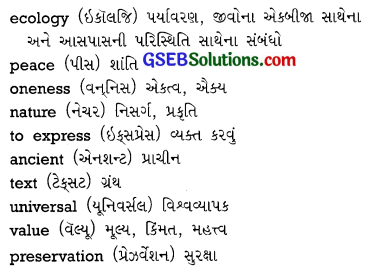
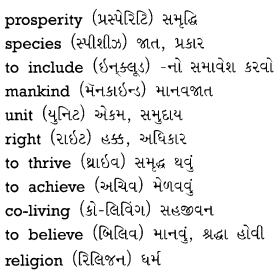
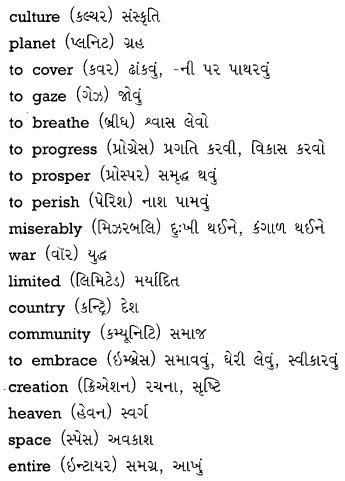
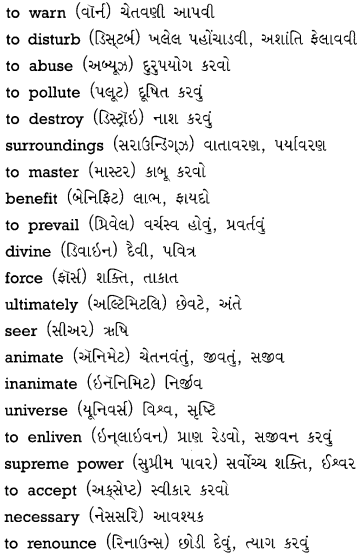
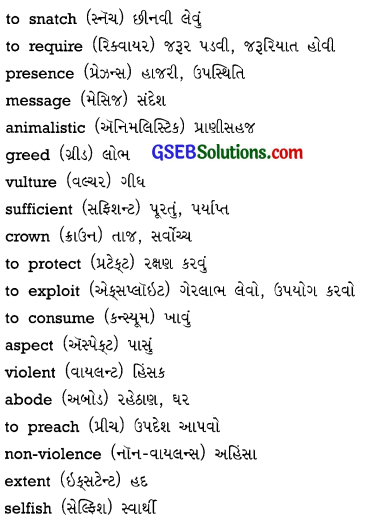
Idioms and Phrases
(1) to keep someone away from something
Please keep the children away from electric appliances.
![]()
(2) in the blood of
Music is in the blood of the entire Sharma family.